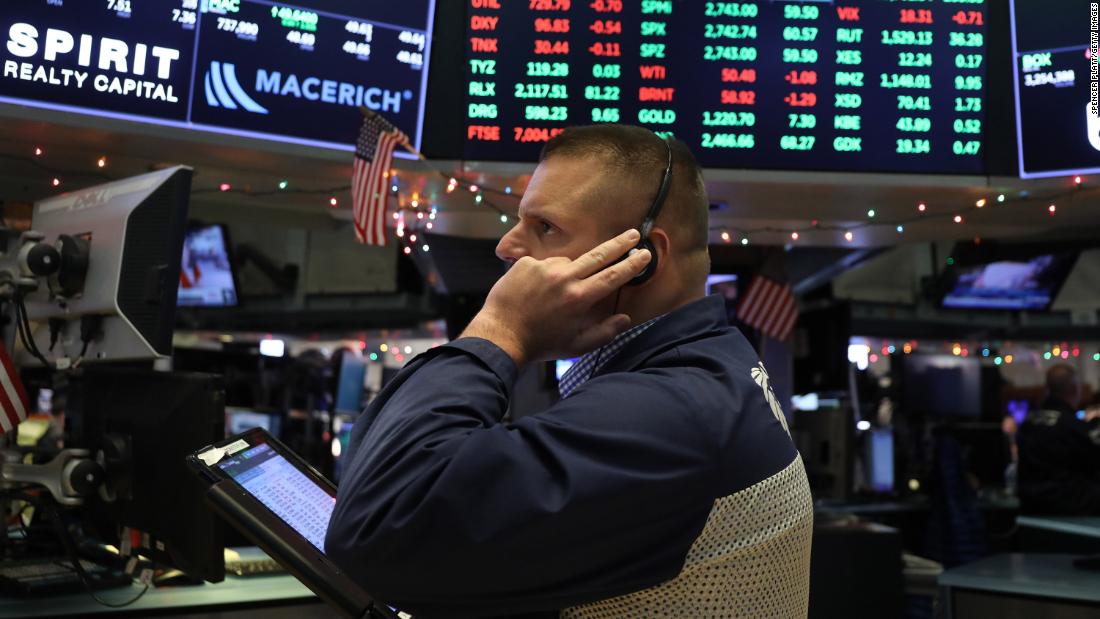
The Dow spiked 618 points — its second best day of the year — after a speech by Powell was interpreted as signaling he would ease up on raising interest rates. Investors rejoiced: A slower pace on rates would allay fears that the Fed will lift borrowing costs more quickly than the economy can handle.
But in the light of day, some Fed watchers are warning that Powell's speech is being misinterpreted by the bulls on Wall Street.
"The market reacted positively because the market hears what it wants to hear," Ian Shepherdson, chief economist at Pantheon Macroeconomics, told CNN Business.
Goldman Sachs chief economist Jan Hatzius headlined a report to clients: "Powell speech in line with prior remarks."
If that's the case, then why did investors celebrate?
'Just below' what?
It all comes down to something called the "neutral rate," a theoretical level where rates are neither speeding up nor slowing down economic growth.
Investors seized on this crucial line in Powell's speech: Interest rates "remain just below the broad range of estimates of the level that would be neutral for the economy."
At first glance, that line, particularly the "just below" part, sounds like a major shift from October 3 comments by Powell that spooked the market. Back then, the Fed chief told PBS that the central bank was a "long way from neutral," implying it could need to hike rates significantly higher.
The Fed had previously signaled one more hike in 2018 and up to three next year.
'Statement of fact'
But Powell's comments this week that rates are just below the neutral range may have just been stating the obvious. Fed officials regularly publish their best guess of where neutral is. In September, those estimates ranged between 2.5% and 3.5%. Rates are currently at 2% to 2.25%.
In other words, the top end of the current range is in fact just one (0.25 percentage point) hike away from the bottom of that range.
"He just gave a simple statement of fact," said Shepherdson. "It's like saying night follows day. So what?"
Stephen Gallo, head of FX strategy at BMO Capital Markets, summed it up this way: "Duh."
"Powell's remarks will be remembered more for the market response they triggered than for the true substance they offered," Gallo wrote to clients on Thursday. "Investors will grab their painkiller dose whenever it's on offer."
Stocks turned positive on Thursday after the Fed released minutes from its November 7-8 meeting that showed a desire to emphasize the central bank will take a "flexible" approach in response to "changing economic circumstances." Officials at the meeting discussed the need to change the Fed's statement to drive that point home.
However, the Fed minutes did not show a consensus yet around the idea that rates are getting close to slowing the economy. Only a "couple of" officials felt that rates might be near the neutral level, the minutes said.
Did Powell set off a Santa Claus rally?
Others see the market's reaction as valid because Powell was truly signaling a potential pause in rate hikes. Perhaps the Fed is starting to grow worried about the negative impact that higher borrowing costs are having on the economy, especially the credit-sensitive housing market.
Powell has also come under heavy fire from President Donald Trump, who told the Washington Post on Tuesday that he's "not even a little bit happy" with his central bank chair.
"The October 3 comment was a gaff, and Powell took it back yesterday," Ed Yardeni, president of investment advisory Yardeni Research, wrote to clients on Thursday.
Yardeni predicted Powell's comments will catapult the S&P 500 back near its September 20 record high of 2930 by the end of the year. That would translate to a rally of about 7% from current levels.
"If Janet Yellen was the 'Fairy Godmother of the Bull Market,' as we often fondly called her, then Powell for now is the bull market's Santa," Yardeni wrote.
Perhaps Powell's comments were purposefully vague to give everyone something to be happy about.
Such a strategy would also give the Fed flexibility to see what comes out of Trump's pivotal meeting this weekend with Chinese President Xi Jinping. A failure to reach a cease fire in the US-China trade war could lead to more tariffs. And tariffs make life very, very difficult for the Fed because they can both slow economic growth and accelerate inflation.
"I suspect there's a lot of finger-crossing at the Fed in the hopes something comes out of Trump's one-on-one with Xi Jinping," said Shepherdson.
Bagikan Berita Ini














0 Response to "Jay Powell spoke. Investors were overjoyed. But did they hear him right?"
Post a Comment